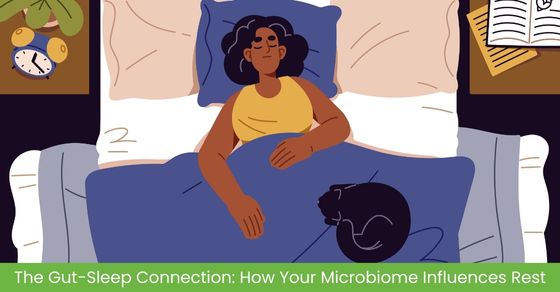A good night’s sleep is one of the fundamental elements of overall health, yet many people struggle with sleep issues ranging from insomnia to snoring. Individuals with ADHD frequently have trouble “shutting down” at night and getting the sleep they need because they have difficulty regulating brain activity. ADHD can increase the time it takes to fall asleep, the frequency of sleep disruptions, and the incidence of sleep deprivation.
Research increasingly points to an unexpected factor influencing sleep quality: the gut microbiome. This community of trillions of microorganisms resides throughout the body, with the majority living in the digestive system. Far from being passive residents, these bacteria actively shape many aspects of our well-being, including sleep, digestion, immune function, and mood. Recent research sheds new light on how these microbes affect when and how we sleep, offering insights into possible solutions for better rest.
How the Gut Microbiome Shapes Sleep Quality
Researchers at Shandong University recently investigated the connection between gut bacteria and sleep, and found that the composition and diversity of gut microbes can influence sleep duration, a person’s preferred sleep schedule (chronotype), and the likelihood of certain sleep disorders (Yue et al., 2023). Their study analyzed extensive health data from global populations and identified specific bacteria linked to sleep outcomes.
The findings show that higher levels of certain bacteria, such as Lachnospiraceae UCG004 and Odoribacter, are associated with longer sleep duration. These beneficial microbes thrive in fibre-rich diets, highlighting the importance of dietary choices in maintaining both gut and sleep health. In contrast, other bacteria such as Selenomonadales and Negativicutes were found to increase the risk of insomnia, underscoring the delicate balance of the gut microbiome in promoting restful sleep.
The study also revealed that “night owls,” or people with an evening chronotype, were more likely to harbour higher levels of Enterobacteriaceae and Anaerofilum—bacteria linked not only to sleep timing but also to obesity. Meanwhile, the presence of Ruminococcus torques correlated with an increased risk of snoring, while people with more Senegalimassilia in their gut tended to snore less and were more likely to maintain a healthy weight. These findings suggest that gut health may be a powerful but underappreciated influence on both the quality and patterns of sleep, opening new doors to personalized, microbiome-based sleep interventions.
Serotonin, Melatonin, and the Gut-Brain Axis
The gut’s influence on sleep isn’t just limited to bacterial composition. Gut bacteria also play a role in the production of serotonin, a neurotransmitter that regulates mood, digestion, and sleep-wake cycles. Although serotonin is often thought of as a brain chemical, around 90% of it is produced in the gut. Some beneficial bacteria promote serotonin synthesis, which the body converts into melatonin — the hormone responsible for signaling when it’s time to sleep.
Animal studies suggest that disruptions to gut bacteria can alter serotonin production and disrupt sleep patterns. While more human studies are needed, this research emphasizes the importance of gut health for regulating sleep and mood.
How Poor Sleep Affects Gut Health
The relationship between the gut and sleep is not one-sided; poor sleep also has a profound impact on gut health. Chronic insomnia and irregular sleep schedules can impair digestion, increase gut inflammation, and exacerbate gastrointestinal conditions such as gastroesophageal reflux disease (GERD) and irritable bowel syndrome (IBS). Poor sleep also contributes to “leaky gut,” where the intestinal barrier weakens, allowing harmful substances to enter the bloodstream and trigger inflammation.
In addition to direct effects on the gut, sleep deprivation influences eating habits. People with inadequate sleep tend to crave high-sugar, high-fat foods for energy, which can promote the growth of harmful bacteria and reduce microbial diversity. Over time, these dietary patterns can worsen both gut health and sleep quality, creating a feedback loop of poor sleep and bad digestion.
Supporting Sleep Through Gut Health
Given the emerging evidence linking gut bacteria to sleep, optimizing the gut microbiome may be a valuable strategy for achieving better rest. Here are some practical ways to promote a healthy gut and improve sleep quality:
Eat Fibre-Rich Foods: A diet high in fibre promotes the growth of beneficial bacteria like Lachnospiraceae and Odoribacter. Make sure you are eating plenty of legumes, whole grains, fruits, and vegetables.
Incorporate Fermented Foods: Probiotic-rich foods such as yogurt, kefir, sauerkraut, and kombucha introduce live bacteria that support gut diversity.
Consider Probiotic and Prebiotic Supplements: Probiotics can help replenish beneficial bacteria, while prebiotics (found in foods like garlic, onions, and bananas) feed the healthy bacteria already present in the gut.
Reduce Processed Foods and Sugar: Limiting sugar and processed foods discourages the growth of harmful bacteria that can disrupt sleep.
Establish a Regular Sleep Routine: Going to bed and waking up at the same time each day helps regulate your circadian rhythm, which in turn supports gut health.
Manage Stress Levels: Chronic stress affects both the gut and sleep quality, so relaxation techniques like yoga, meditation, or journaling can help maintain balance.
Get Enough Physical Activity: Exercise promotes better sleep and enhances the diversity of the gut microbiome.
The Potential of Gut-Based Treatments for Sleep Disorders
The Shandong University study suggests that future treatments for sleep disorders could focus on personalized microbiome interventions. For example, individuals with insomnia might benefit from probiotic supplements targeting specific bacteria associated with longer sleep duration. Likewise, those struggling with snoring or irregular sleep patterns could explore dietary strategies to shift their microbial balance.
These findings underscore the importance of maintaining a healthy gut not only for digestive health but also for sleep and overall well-being. With further research, we may see new treatments that combine dietary adjustments, probiotics, and lifestyle changes to improve sleep outcomes by targeting the gut.
Simple changes like eating more fibre, incorporating probiotics, and maintaining a consistent sleep schedule can go a long way toward nurturing your gut and improving your rest. The next time you find yourself tossing and turning, it might be worth considering what you eat. A well-balanced microbiome could be the key to sleeping soundly and waking up refreshed.


